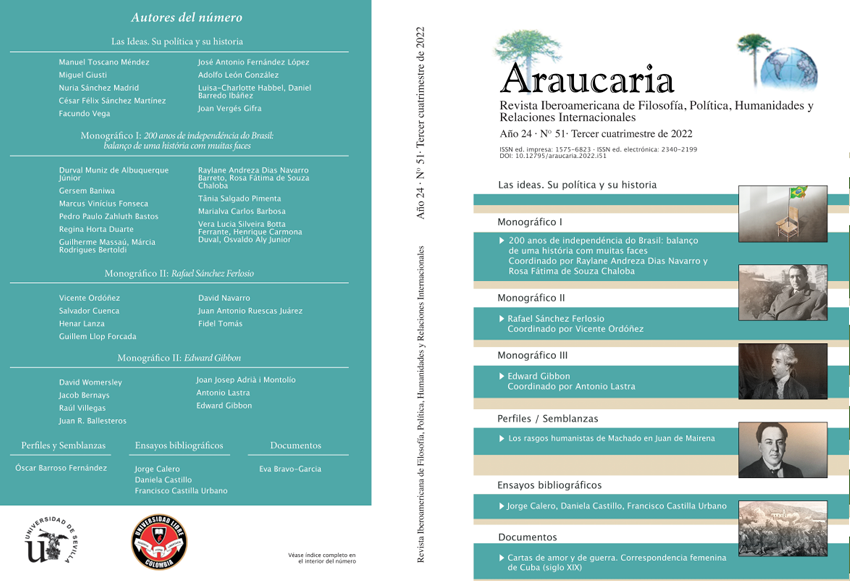La dimensión cosmopolita de la protección jurídica en Kant. Algunas consecuencias de la “posesión común de la tierra” en la Doctrina del Derecho
DOI:
https://doi.org/10.12795/araucaria.2022.i51.03Palavras-chave:
Kant, derecho cosmopolita, equidad, beneficencia, vulnerabilidad jurídica, pueblos sin EstadoResumo
Este artículo examina la protección jurídica resultante del derecho cosmopolita en Kant con el fin de arrojar luz sobre su articulación con la protección ofrecida por el derecho político estatal. En primer lugar, analizaré el tratamiento de la equidad en la Doctrina racional del Derecho, como un espacio normativo que, sin recurrir a la coacción legal, transmite al sujeto la deuda en que se encuentra con los individuos más desfavorecidos económicamente. En segundo lugar, comentaré algunos textos en que Kant se ocupa del respeto legal que merecen los pueblos sin Estado. La reflexión kantiana sobre la vulnerabilidad jurídica en estos dos casos me permitirá sostener que el planteamiento de la protección legal en clave cosmopolita funciona como un operador regulativo en el derecho político kantiano, llamado a orientar la conducta de Estados y ciudadanos en el trato que deparan al resto de sujetos que habitan la Tierra. Por ello mismo, esta interpretación subraya el hecho de que el derecho cosmopolita en Kant aparezca como un derecho privado de coacción en la filosofía política de Kant.
Downloads
Referências
Corradetti, C., Kant, Global Politics and Cosmopolitan Law. The World Republic as a Regulative Idea of Reason, London, Routledge, 2020.
Cubo, Ó., “El origen de la desigualdad en la Doctrina del derecho de Kant”. Manuscrito cedido por el autor, 2021.
Flikschuh, K., “Enthusiastic Cosmopolitanism” [en A. Cohen (ed.), Kant on Emotion and Value, London, Palgrave McMillan, 2014], pp. 265–283].
Flikschuh, K., “Kant’s Sovereignty Dilemma. A Contemporary Analysis”, The Journal of Political Philosophy, 18/4 (2010a), pp. 469-493.
Flikschuh, K., “Innate Right and Acquired Right in Arthur Ripstein’s Force and Freedom”, Jurisprudence, 1/2 (2010b), pp. 295-304.
Flikschuh, K., “Kant’s Nomads: Encountering strangers”, Con-textos Kantianos, 5 (2017), pp. 346-368.
Huber, J., “Cosmopolitanism for Earth Dwellers: Kant on the Right to be Somewhere”, Kantian Review, 17/1 (2017a), pp. 1-25.
Huber, J., “Theorising from the Global Standpoint: Kant and Grotius on Original Common Possession of the Earth”, European Journal of Philosophy, 25 (2) (2017), pp. 231-249.
Huber, J., What Makes Human Rights Political? A Kantian Critique, Journal for Human Rights/Zeitschrift für Menschenrechte, 7/2 (2013), pp. 127-141.
Kant, I., Gesammelte Schriften, Berlin, Preußische Akademie der Wissenschaften, (1900-).
Kant, I., Metafísica de las costumbres, estudio preliminar de Adela Cortina, trad. de Adela Cortina y Jesús Conill, Madrid, Tecnos. 1989.
Kant, I., ¿Qué es la Ilustración?, ed. de Roberto R. Aramayo, Madrid, Alianza, 2004.
Kant, I., La paz perpetua, ed. de Joaquín Abellán, Madrid, Alianza, 2016.
Kersting, W., “Kant’s Concept of the State” [en Howard Williams, ed., Kant’s Political Philosophy, Chicago, Chicago U.P., 1992], pp. 143-165.
Marey, M., “A Kantian Critique of Grotius”, Problemos 95 (2019), pp. 67-80.
Mieth, C., “Kant, soziale Menschenrechte und korrespondierende Pflichten” (con C. Bambauer) [en Reza Mosayebi, ed.: Kant und Menschenrechte, Berlin/Boston, De Gruyter, Berlin/Boston 2018], pp. 101-130.
Muthu, S., “Productive Resistance in Kant’s Political Thought: Domination, Counter-Domination, and Global Unsocial Sociability” [en K. Flikschuh/L. Ypi, eds., Kant and Colonialism. Historical and Critical Perspectives, Oxford, OUP, 2014], pp. 68–99.
Niesen, P., “Colonialism and Hospitality”, Politics and Ethics Review 31/1 (2007), pp. 90–108.
Pinheiro Walla, A., “Private Property and Territorial Rights: a Kantian Alternative to Contemporary Debates” [en Pinheiro Walla, A./Demiray, R. (eds.), Reason, Normativity and Law: New Essays in Kantian Philosophy, Cardiff, University of Wales Press, 2020], pp. 213-232.
Pinheiro Walla, A., “A Kantian Foundation of Welfare Rights”, Jurisprudence 11 (2019), pp. 1-16.
Pinheiro Walla, A., “Common Possession of the Earth and Cosmopolitan Right“, Kant-Studien 107/1 (2016), pp. 160-178 [traducido por M. Marey como “Posesión común de la tierra y derecho cosmopolita“, Las Torres de Lucca 7/13 (2018), pp. 255-276).
Pinheiro Walla, A., “A Commentary on Anna Stilz, Nations, States, and Territory and Lea Ypi, A Permissive Theory of Territorial Rights” [en Cara Nine (ed.), Territory and Justice Symposia 2014 edition (2014), 3], pp. 1-6.
Pinzani, A., “Der systematische Stellenwert der pseudo-ulpianischen Regeln in Kants Rechtslehre”, Zeitschrift für philosophische Forschung, 59/1 (2005), pp. 71-94.
Ripstein, A., “Embodied Free Beings under Public Law: A Reply” [en S. Kisilevsky/M.J. Stone (eds.), Freedom and Force. Essays on Kant’s Legal Philosophy, Nueva York, Bloomsbury, 2017], pp. 183-217.
Ripstein, A. “Reply to Flikschuh and Pavlakos”, Jurisprudence 1/2 (2010), pp. 317-324.
Ripstein, A., Force and Freedom. Kant’s Legal and Political Philosophy, Cambridge (Mass.), Harvard University Press, 2009.
xxxxxxx: “Kantian Theory of Human Rights: a Skeptical Appraisal”, Studia Philosophica Kantiana 2 (2016), pp. 3-15.
Xxxxxxx, “Kant’s Criticism of European Colonialism: A Contemporary Account of Cosmopolitan Right”, Problemos, 94 (2018), 71-82.
Xxxxxxx, “Kant’s Criticism of Colonialism. The Political Rights of Non-State People” [en VV.AA., Nature and Freedom/Natur und Freiheit. Proceedings of 12th Kant Congress, Berlin/Boston, W. de Gruyter, 2019], pp. 2435-2442.
Shklar, J., Faces of Injustice, New Haven (Conn.), Yale U.P., 1990.
Vaha, M., The Moral Standing of the State in International Politics. A Kantian Account, Cardiff, Wales University Press, 2021.
Vanhaute, L., “Colonists, Traders, or Settlers? Kant on Fair International Trade and Legitimate Settlement” [en K. Flikschuh and L. Ypi (eds.), Kant and Colonialism. Historical and Critical Perspectives. Oxford, Oxford University Press, 2014], pp. 127–144.
Waldron, J. “The Principle of Proximity”, New York University Public Law and Legal Theory Working Papers, 255 (2011) (acceso el 12 de agosto de 2021).
Ypi, L., “A Permissive Theory of Territorial Rights”, European Journal of Philosophy 22/2 (2014), pp. 288-312.
Downloads
Publicado
Como Citar
Edição
Seção
Licença
Las ediciones impresa y electrónica de esta Revista son editadas por el Secretariado de Publicaciones de la Universidad de Sevilla, siendo necesario citar la procedencia en cualquier reproducción parcial o total.Salvo indicación contraria, todos los contenidos de la edición electrónica se distribuyen bajo una licencia de uso y distribución “Creative Commons Atribución-NoComercial-SinDerivar 4.0 Internacional”








